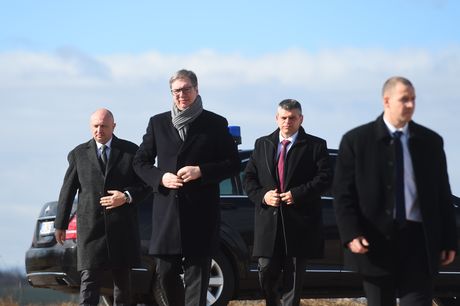Vucic arrives in Bulgaria: Construction of gas connector with Serbia begins

President of Serbia Aleksandar Vucic has arrived in Kostinbrod, near Sofia, where the construction of a gas interconnector between Serbia and Bulgaria in Bulgarian territory begins today.
Vucic was welcomed at the construction site by President of Bulgaria Rumen Radev, and they started a bilateral meeting with the delegations.
The head of the EU delegation in Serbia, Emanuele Giaufret, is also present.
Vucic and Radev will then visit the works and attend the joining of the gas pipes.
A video address by EU Energy Commissioner Kadri Simson is planned, and Serbian President Vucic will also speak at the start of the works.
The inter-system gas connection "Bulgaria-Serbia" (IBS) will be 109 kilometers long in Serbia, while the total length of the two-way gas pipeline through both countries is 170 kilometers, from Novi Iskar near Sofia to Nis.
The gas pipeline has a capacity of 1.8 billion cubic meters per year and is a project of common interest to the EU.
The energy ministers of both countries, Rossen Hristov and Dubravka Djedovic, as well as the executive director of Bulgartransgaz Vladimir Malinov and Srbijagas Dusan Bajatovic, are attending the meeting on the occasion of the start of works to build the gas pipeline, reports Tanjug.
The total value of the gas interconnector Nis-Dimitrovgrad-Bulgaria, according to the estimate of the European Investment Bank, is 85.5 million euros, of which the EIB provided 25 million euros in the form of a loan, 49.6 million is non-refundable EU co-financing from IPA funds, while the rest will be expenses to be covered from the budget of Serbia and the funds of the public company Srbijagas.
The main contractor is Glavbolgarstroy.
As announced, the gas interconnection between Serbia and Bulgaria will be operational in mid 2023.
The works include the construction of the two-way main gas interconnector MG10 Nis-Dimitrovgrad in the territory of Serbia, between the natural gas systems of Serbia and Bulgaria, as well as the construction of four metering and regulation stations and supporting facilities.
The agreement to build the gas pipeline was signed in 2010, and the works on the construction of the gas connector in Serbia began in February 2022.
President of Serbia Aleksandar Vucic attended the opening of the gas interconnector between Bulgaria and Greece in Sofia in October last year, and stated then that Serbia has started the construction of a gas interconnector with Bulgaria in its territory and that the two countries will complete the project in a year.
Thanks to the gas interconnector with Greece, Bulgaria will receive natural gas from Azerbaijan and LNG (liquid) gas through the port in the north of Greece.
The LNG terminal in Alexandroupolis in the north of Greece, as announced at the time, should be ready by the end of this year.
The gas interconnector will be in full synergy with the LNG terminal in Alexandroupolis and will be a link to the Southern Gas Corridor and provide an alternative gas supply from the Caspian region.
President of Azerbaijan Ilham Aliyev said at the time that in 2022, the country will increase its exports to more than 22 billion cubic meters and that 11.5 billion will go to European consumers.
"In July, we signed a memorandum of understanding with the EC and it is a very important document based on which we plan to double our supply of natural gas to Europe by 2027," Aliyev said.
After the ceremony today, Vucic and Radev will have a face to face meeting in Sofia.
Video: Vucic arrives to Bulgaria, meets with Radev
(Telegraf Biznis)
Video: Vremenska prognoza na Telegrafu: Šta nas čeka tokom Uskrsa i za 1. maj
Telegraf.rs zadržava sva prava nad sadržajem. Za preuzimanje sadržaja pogledajte uputstva na stranici Uslovi korišćenja.

